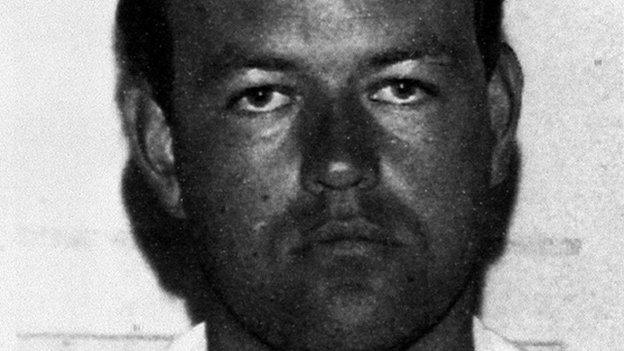'DNA' child killer Colin Pitchfork gets parole review
- Published

Colin Pitchfork was the first person to be convicted using DNA evidence
The case of a notorious child killer who became the first man to be convicted under DNA evidence is being considered by the Parole Board.
Colin Pitchfork was given a life sentence in 1988 for the rape and murder of 15-year-old schoolgirls Lynda Mann and Dawn Ashworth, from Leicestershire.
The mother of one of the girls said "life should mean life".
Barbara Ashworth said: "I think the key should have been thrown away long ago."
"No matter how he says that he feels that his character has been reformed you really don't know until he's out walking the streets," she said.
"He has no right to any freedom at all, because he took the lives of two girls... why should he be able to continue his life?"
The judge who sentenced Pitchfork described him as "a danger to young women" whose crimes were of a "particularly sadistic kind".
'Exceptional progress'
Pitchfork was caught after the world's first mass screening for DNA, in which 5,000 men were asked to volunteer blood or saliva samples. Initially, he evaded capture by getting a friend to take the test for him.
He was given a life sentence with a minimum term of 30 years.
The Lord Chief Justice at the time, Lord Lane, said: "From the point of view of the safety of the public I doubt if he should ever be released."
But in 2009, the Court of Appeal reduced the minimum term to 28 years to take into account the "exceptional progress" Pitchfork had made in custody.
The court said the former baker had sought to address the reasons for his offending, achieved "a high standard of education, to degree level", never been placed "on report" while in custody and was "trusted to help with the well-being" of fellow inmates.
It added that Pitchfork, who is now 55, had become a specialist in transcribing printed music into Braille, work which was used across the UK and internationally.
In September this year, Pitchfork will have served 28 years - including the time he spent on remand after his arrest in 1987.
The parole review process - which normally begins six months before a prisoner's earliest possible release date - involves gathering information from probation staff, prison officers and medical experts.
A Parole Board member decides whether an oral hearing is required, which is thought likely to happen in Pitchfork's case, probably in the summer or early autumn.
Before sanctioning a prisoner's release, the Parole Board has to be sure he or she no longer poses a risk to the public.
If Pitchfork is refused parole, his case will be reviewed within two years.
Parole Board figures for 2013-14 show that of 1,161 lifers who had oral hearings about one-third, 379, were released, 313 were refused parole and 469 were recommended for transfer to an open prison.